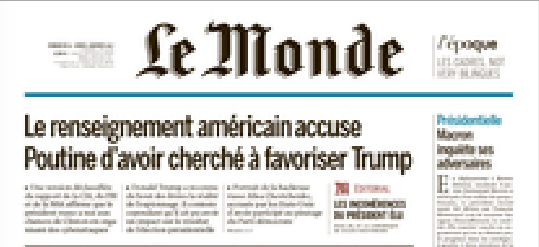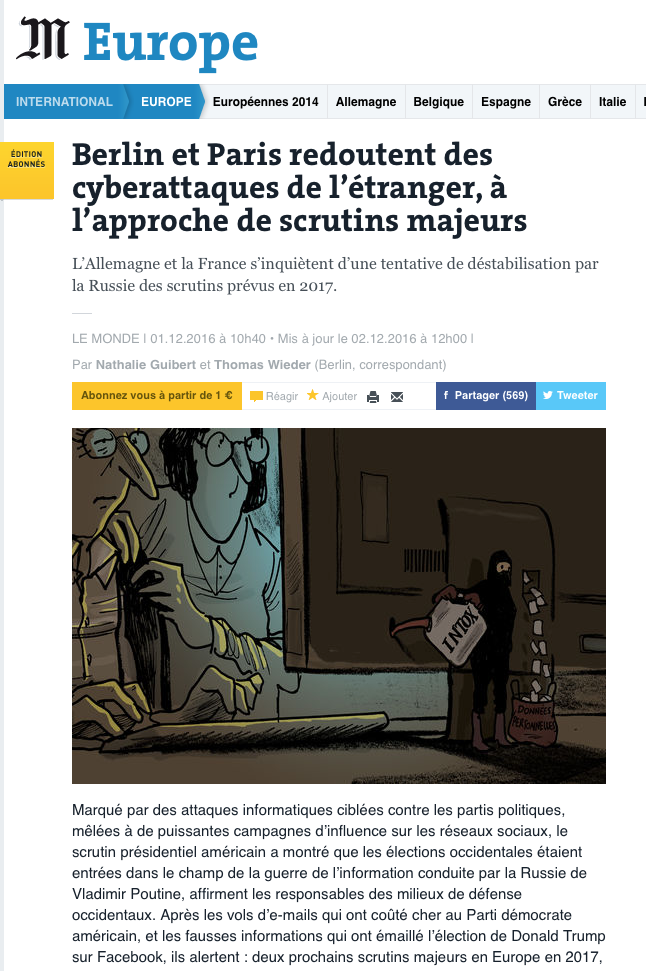
Left and Right are having
a meltdown over Russia
US political and intellectual circles seem unaware of the pitiful and discouraging image they have been offering to the rest of the world during, and mostly after, the 2016 Election campaign.
This article, which we reproduce from the New York Post is by far the most reasonable we have read in a long time.

The result of trading clothes isn’t always nice to be seen
In this time of weird reversals, Democrats and liberals who scoffed at Mitt Romney’s 2012 assertion that Russia was our primary adversary have become so convinced of Vladimir Putin’s perfidy, they sound like the Cold Warriors of old.
Meanwhile, our incoming president continues to extend the benefit of the doubt to Russia when it comes to cyber-mischief, even going so far as to get in a public kerfuffle with America’s intelligence agencies and accuse them of rescheduling a briefing on Russia out of rudeness or lack of preparation.
Those agencies have been a consistent subject of liberal Democratic fear and loathing dating from congressional inquests into their alleged evils during the 1970s to the extraordinary rendition and harsh interrogations of enemy prisoners in the years following 9/11.

For his part, Trump clearly thinks the intelligence community is participating in an effort to delegitimize his victory. So he expresses a lack of interest in their briefings and continually reminds the world of the CIA’s mistaken assertion that it was a “slam dunk” that Saddam Hussein had WMDs.
For their part, liberals who reminded the world of the very same thing every day George W. Bush was in office now express outrage at Trump’s public skepticism of intelligence findings and their bona fides.
Want more? In 2010 and 2013, many liberals celebrated the theft of government secrets by Julian Assange of WikiLeaks and the national security contractor Edward Snowden on the grounds they had exposed the excesses of our national security state. Both were the subject of celebratory leftist Oscar-bait movie melodramas.
Now Snowden, who lives under the protection of Putin in Moscow, is in bad odor with his onetime fans here in the States in part because his Boswell, the radical anti-American lawyer-journalist Glenn Greenwald, is siding with Russia.
And since WikiLeaks was the conduit for the release of hacked and stolen Democratic Party emails, Assange has become a pariah for the left — and some kind of new hero for Trump-aligned media types like Sean Hannity, who had once said Assange was “waging war on the US.”
This dizzying transmigration of partisan talking points is like one of those 1980 body-swapping comedies in which a kid ends up in his parent’s body and vice versa. And it’s got the media all turned around as well.
The same media outlets that joined in the laughter at Romney’s anti-Russia talk in 2012 are so eager for news that fits the new narrative line, they will not only suspend disbelief but won’t even do any serious spade work or fact-checking before publishing nonsense.
Last week the Washington Post, on high alert, reported breathlessly that Russia had somehow hacked into Vermont’s power grid. In a matter of days, the Post disavowed the story.
A guy whose personal computer was not even connected to the server at a power company in Burlington had been checking his Yahoo mail and hit a suspicious IP address. This triggered an alert that, in the end, meant nothing anyway.

Some European countries would feel diminished if they weren’t under cyberattack as well.
In December, CNN reported that Russia was retaliating against American sanctions for its hacking mischief by shutting down an Anglo-American school — but the thing is, the school was just closed for vacation.
In late October, when the first major public statements emerged from the intelligence community about Russian misbehavior, Slate published a long article alleging direct communications between Trump and Russia through a secret server — which turned out to be a Trump-affiliated hotel computer connecting to a Russian bank. It was, in the words of Fortune Magazine’s Jeff John Roberts, “horse feathers.”
Instead of bolstering the case against Russian misconduct, stories like these weaken it by causing any rational consumer of news to view subsequent reports on the subject with skepticism and distrust.
Hey, just what we in the media need, more skepticism and distrust! Yay!
Noe same observerot many hours this article by John Podhoretz was published in the “New York Post”) (December 4th, 2017), a pathetic dossier, supposedly aimed at damaging Donald Trump was released by a third rate political publication – BuzzFeed – and unfortunately by CNN as well, and prompted another bitter commentary.
At a moment when journalists are up in arms about “fake news,” what BuzzFeed has done here is take fake news to a new level. Its editor, Ben Smith, acknowledges “there is serious reason to doubt the allegations.” In other words, there is almost certainly fake news inside these memos, and it might all be fake, or some parts of it might be true but buried so deeply under falsity that it would be impossible to separate it out.
“Publishing this dossier reflects how we see the job of reporters in 2017,” Smith writes. This is an amazing thing to say, because if you think it through, it means publishing open libels and slanders is the job of reporters in 2017.
“Fake news will become more sophisticated, and fake, ambiguous, and spun-up stories will spread widely,” warned an important American editor at the end of December 2016. His name: Ben Smith. His publication: BuzzFeed.
Leave a Reply